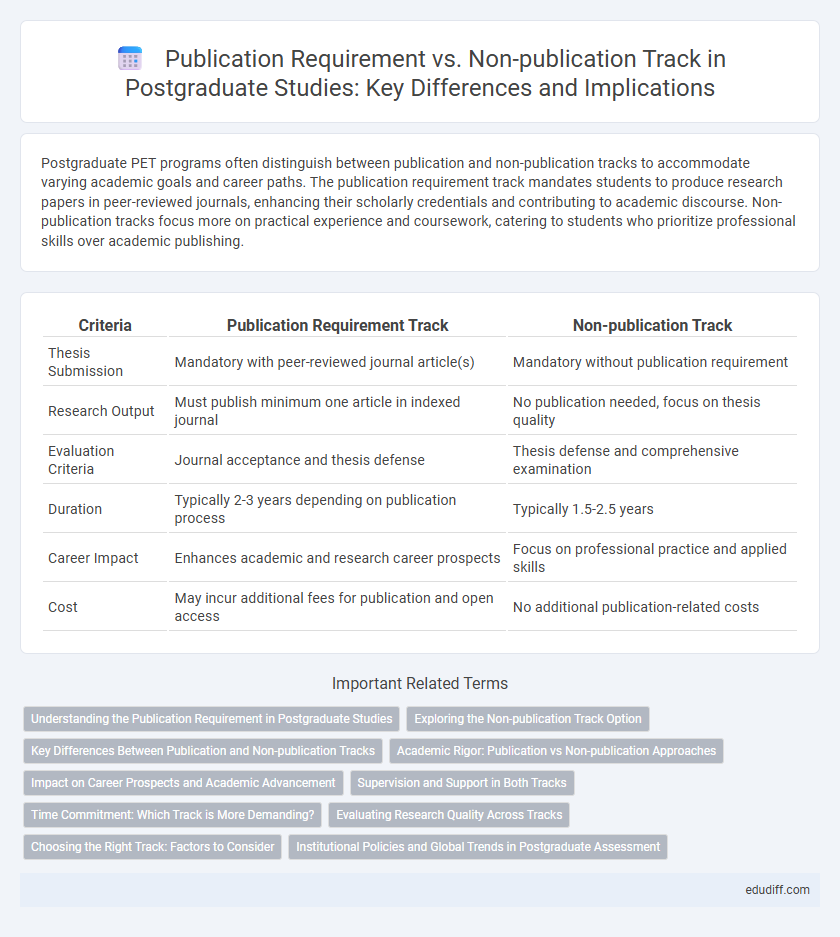Postgraduate PET programs often distinguish between publication and non-publication tracks to accommodate varying academic goals and career paths. The publication requirement track mandates students to produce research papers in peer-reviewed journals, enhancing their scholarly credentials and contributing to academic discourse. Non-publication tracks focus more on practical experience and coursework, catering to students who prioritize professional skills over academic publishing.
Table of Comparison
| Criteria | Publication Requirement Track | Non-publication Track |
|---|---|---|
| Thesis Submission | Mandatory with peer-reviewed journal article(s) | Mandatory without publication requirement |
| Research Output | Must publish minimum one article in indexed journal | No publication needed, focus on thesis quality |
| Evaluation Criteria | Journal acceptance and thesis defense | Thesis defense and comprehensive examination |
| Duration | Typically 2-3 years depending on publication process | Typically 1.5-2.5 years |
| Career Impact | Enhances academic and research career prospects | Focus on professional practice and applied skills |
| Cost | May incur additional fees for publication and open access | No additional publication-related costs |
Understanding the Publication Requirement in Postgraduate Studies
Understanding the publication requirement in postgraduate studies is essential for meeting academic standards and enhancing scholarly contributions. Many universities mandate at least one peer-reviewed journal article to validate research quality and originality, ensuring students engage deeply with their subject matter. Non-publication tracks may focus more on coursework or practical projects, but publication-driven programs promote rigorous research dissemination and academic visibility.
Exploring the Non-publication Track Option
The Non-publication Track option in postgraduate programs allows students to fulfill degree requirements through alternative assessments such as comprehensive exams, research reports, or practical projects instead of traditional journal publications. This pathway offers flexibility for candidates whose research suits applied outcomes or who face challenges in publishing due to the niche or emerging nature of their topics. Choosing the Non-publication Track can expedite program completion while maintaining academic rigor tailored to diverse disciplinary standards.
Key Differences Between Publication and Non-publication Tracks
The publication requirement track mandates students to produce original research articles suitable for peer-reviewed journals, enhancing academic visibility and contributing to their field's knowledge base. The non-publication track emphasizes comprehensive thesis writing and project completion without the obligation of journal publication, allowing for more flexibility in research scope and deadlines. Key differences include the focus on dissemination through journals for the publication track versus a primary emphasis on research quality and academic evaluation in the non-publication track.
Academic Rigor: Publication vs Non-publication Approaches
Publication requirement in postgraduate programs enforces rigorous academic standards by mandating peer-reviewed articles, fostering critical thinking and contributing to scholarly discourse. Non-publication tracks prioritize coursework and comprehensive exams, allowing focus on knowledge mastery without the pressure of producing original research. The publication approach generally enhances research skills and academic visibility, while the non-publication track emphasizes theoretical understanding and practical application.
Impact on Career Prospects and Academic Advancement
Choosing a publication requirement during postgraduate studies significantly boosts career prospects by enhancing research credibility and increasing visibility in academic circles. Graduates who meet publication criteria are more competitive for academic positions, research grants, and collaborative opportunities compared to those on a non-publication track. The non-publication track may limit access to prestigious journals and slow academic advancement, potentially impacting long-term professional growth.
Supervision and Support in Both Tracks
Supervision in both publication and non-publication tracks of postgraduate programs ensures consistent academic guidance through regular meetings and personalized feedback. Support systems include access to research resources, expert advisors, and skill development workshops that foster scholarly growth regardless of publication requirements. Structured mentorship and tailored assistance enhance student success by addressing distinct challenges within each track.
Time Commitment: Which Track is More Demanding?
The publication requirement track in postgraduate programs demands significantly more time commitment due to the extensive research, data analysis, and manuscript preparation involved. In contrast, the non-publication track often focuses on coursework and comprehensive exams, resulting in a relatively lower time investment. Students opting for the publication track should anticipate dedicating multiple months to refining their thesis into publishable articles, making it the more time-intensive path.
Evaluating Research Quality Across Tracks
Evaluating research quality across postgraduate tracks involves assessing publication output as a key metric in the Publication Requirement track, which emphasizes peer-reviewed journal articles and conference papers to demonstrate scholarly impact. The Non-publication Track prioritizes alternative measures such as capstone projects, patents, or professional practice outcomes, reflecting applied research contributions beyond traditional publications. Effective comparison requires standardized criteria that capture both quantitative and qualitative dimensions of research excellence across diverse academic and practical outputs.
Choosing the Right Track: Factors to Consider
Evaluating the publication requirement versus non-publication track in postgraduate studies involves assessing factors such as career goals, time constraints, and research interests. Students aiming for academic or research-oriented careers benefit from the publication track, which enhances their profiles and facilitates knowledge dissemination. Those prioritizing professional advancement or facing tight deadlines may prefer the non-publication track for its flexibility and practical focus.
Institutional Policies and Global Trends in Postgraduate Assessment
Institutional policies increasingly emphasize publication requirements in postgraduate assessment to align with global trends promoting research dissemination and academic rigor. Non-publication tracks remain valuable for applied fields prioritizing practical skills, reflecting a diverse approach to postgraduate evaluation worldwide. Balancing these tracks supports inclusivity while maintaining standards that drive scholarly impact and professional development.
Publication Requirement vs Non-publication Track Infographic

 edudiff.com
edudiff.com